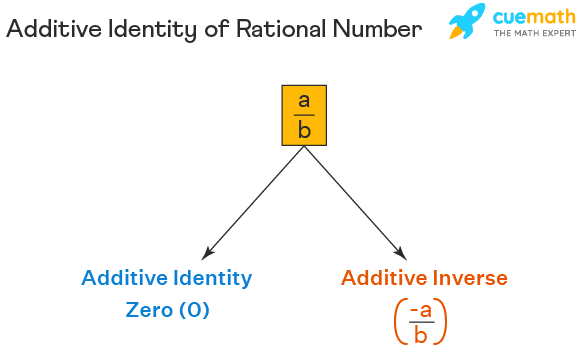Additive Identity of Rational Numbers
Additive identity of rational numbers is 0. It is one of the properties of addition. Additive inverse refers to the number we add to a given number to make the sum zero. Thus, we can say that the additive inverse of any rational number 'a/b' is b/a.
In this article, let's discuss the additive identity of rational numbers with solved examples and practice questions.
What is Additive Identity of Rational Numbers?
Additive identity is a number, which when added to any number, gives the sum as the number itself. Adding 0 to any number, gives the sum as the number itself and thus, the additive identity is “0” Now, the additive identity of rational numbers is also 0. The formula of the additive identity of rational numbers is written as x/y + 0 = x/y. This explains that when any number is added to zero, the sum is the number itself.
For any set of numbers, that is, all integers, rational numbers, complex numbers, the additive identity is 0. It is because when you add 0 to any number; it doesn’t change the number and keeps its identity. Therefore, a + 0 = 0 + a = a, where, a is any number.

Additive Identity Property
As per the additive identity property, the sum of a number and its additive inverse is 0. For example, consider a rational number 1/3. The additive inverse of 1/3 is -1/3. According to the property, 1/3 + (-1/3) = 0. Hence Proved.
Each real number is said to be the additive inverse of the other if their sum is zero. That means, R+(-R) = 0, where R is a Real number. R and -R are the additive inverses of each other. We know that rational numbers are a classification of real only. Thus, it goes for rational numbers as well. Consider the rational number 3/4. 3/4 + (-3/4) = 0. Here 3/4 is the additive inverse of -3/4 and vice versa.
Additive Identity and Additive Inverse of a Rational Number
In a given mathematical system, the additive identity refers to an identity element that you add to a given number to make the sum zero. For the group of rational numbers, it is 0. The "Additive Identity" is 1, because adding zero to any number leaves it unchanged: a + 0 = 0 + a = a.
For additive inverse, the sum of a rational number and its inverse should be equal to zero. For multiplicative inverse, the multiplication of a rational number with its reciprocal should be equal to 1.
Related Articles:
Given below is a list of articles related to the additive identity of rational numbers.
- Additive Inverse Calculator
- Additive Inverse vs Multiplicative Inverse
- Inverse Operations
- Reciprocal Definition
- Reciprocal Function
Important Notes
- The additive identity property is also called the zero property of addition.
- The given number can be a whole number, a natural number, an integer, a fraction, a decimal, or any real number. The additive inverse is just the negative of the given number.
Examples on Additive Identity of Rational Numbers
-
Example 1: Which of the following equation is an example of the additive identity property of rational numbers?
a) -7/8 + 0 = -7/8
b) 7/8 + 1/8 = 1Solution:
Equation (a) -7/8 + 0 = -7/8 is an example of the additive identity property.
Equation (b) 7/8 + 1/8 = 1 is not an example of the additive identity property.
Answer: Therefore, equation a) -7/8 + 0 = -7/8 is an example of the additive identity property of rational numbers.
-
Example 2: Find the multiplicative inverse of -3/5. Also, determine its multiplicative identity.
Solution:
The additive inverse of -3/5 is 5/3.
On adding -3/5 and 5/3, the sum is 0.
(-3/5) + ( 5/3) = 0.
Answer: Therefore, the additive inverse of -3/5 is 5/3 and additive identity is 0.

FAQs on Additive Identity of Rational Numbers
What Is the Additive Identity of a Rational Number?
The additive identity of a rational number is 0 as the sum of a number and its additive inverse is 0. For example, for the rational number 6/7, its additive inverse equals -6/7, whereas its additive identity is 0.
How To Find the Additive Identity of a Rational Number?
Additive identity refers to an identity element that leaves the number unchanged when added with that number. For any number x, e is the element element such that e + x = x + e = x. In the case of rational numbers also, the additive identity is 0 only.
Can the Additive Identity of a Rational Number Be 1?
Additive identity of any number leaves the number remains unchanged when added to that number. Thus, it is always 0 and can't be 1.
What is the Other Name of the Additive Identity Property?
Since zero is the identity element, thus, the additive identity property is also known as the zero property of addition or the identity property of zero. When zero is added to a number, their sum equals the number itself.
What Is the Additive and Multiplicative Identity of Rational Numbers?
According to algebra, every mathematical operation is associated with some major identities. Additive identity and multiplicative identity are the two basic algebraic identities. For rational numbers, natural numbers, whole numbers, and integers zero is the additive identity and 1 is the multiplicative identity.
visual curriculum
